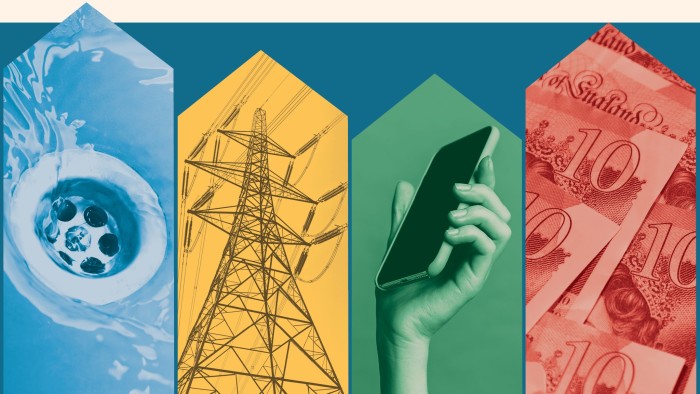UK consumers are about to be hit by a series of price increases from this month, in what parts of the British media are dubbing “awful April”.
Increases to water, energy and telecoms bills will push up inflation, even as chancellor Rachel Reeves’ £25bn boost to employers’ national insurance kicks in, leading employers both to raise prices and to curb wages.
Kemi Badenoch, Conservative party leader, will cite the price increases as she attacks the Labour government, warning that the “true cost of Rachel Reeves will really hit home with a vicious cocktail of bill increases and price rises”. Mel Stride, shadow chancellor, has called April 1 “Rachel’s Cruel Day”.
While the increases will hit many households hard, they come at a time when surveys point to greater optimism among consumers, thanks in part to strong inflation-adjusted wage growth in 2024.
Here are the prices that are set to move — and the likely economic and political fallout.
What prices are being increased?
Regulated energy bills are set to rise by 6 per cent to £1,849 for a typical household, while average water bills are set to climb by 26 per cent to £603.
Council tax rises will also come through, with some local authorities permitted to push through larger increases than the 4.99 per cent usually allowed before triggering a local vote.
On top of this, many customers will face increases in other charges, for example, on broadband and mobile phone services.
Meanwhile, the government’s increase in employer national insurance and minimum wages kicks in from April 6. Companies are expected to offset this through a mix of hiring freezes, lower pay awards and price increases.
“It is just a load of price hikes coming all at once — and on things you by and large can’t avoid,” said Paul Dales, chief UK economist at Capital Economics.
What does it mean for inflation?
The price rises are bound to push up inflation in the short term and are a main reason why the Bank of England expects CPI inflation to hit 3.7 per cent in the third quarter of 2025.
Chris Hare, senior economist at HSBC, said last week that even though discounting by fashion retailers pulled CPI inflation down to 2.8 per cent in February, there was still “a fairly pronounced and persistent inflation ‘hump’ above 3 per cent” on the way that would run into 2026.
The BoE has said it does not expect this to have any lingering consequences for underlying inflationary pressures in the economy. But there are two big sources of uncertainty: how far businesses will seek to pass higher labour costs on to consumers, as opposed to squeezing wages; and whether the UK will retaliate if it falls victim to rounds of US tariffs.
The Office for Budget Responsibility, the fiscal watchdog, estimates that 60 per cent of the NICs increase will be passed on through lower wages or higher prices in 2025-26, its first year of operation.
How well will households weather the shock?
The saving grace is that the price increases follow a long period of strong wage growth. Earnings rose nearly 6 per cent over the past year, according to the latest official data, comfortably outpacing inflation.
Households appear to have been stashing much of this away, saving 12 per cent of their income in the final three months of 2024 — the highest on record outside the Covid-19 pandemic. They may now be ready to start spending again, with the latest data showing a rebound in retail sales and slower flows into savings accounts.
“UK consumers seem to be finding their feet again,” said Robert Wood, chief UK economist at the consultancy Pantheon Macroeconomics.
“Perhaps the big hit from higher interest rates is now behind us,” said Sandra Horsfield, economist at Investec. But she warned that surveys were now pointing to a slowdown in wage growth, even as businesses raised prices in response to the rise in payroll taxes.
“Real wage growth going forwards won’t be as strong,” she said. “That will naturally place a limit on how much extra consumer spending we will get.”
How is it playing politically?
The idea that Labour is hitting living standards is a critical part of the Conservative campaign ahead of the local elections on May 1, with Badenoch admitting her party faces an “extremely difficult” battle in the weeks ahead.
Labour insists that April 1 will be seen by many families as a good day, thanks to an increase in the national living wage that will be worth an extra £1,400 per year for an eligible full-time worker. The rate for those aged over 21 will rise from £11.44 an hour to £12.21.
“This pay rise for over 3mn of the lowest-paid workers was a priority for this government,” said deputy prime minister Angela Rayner. “We’re already giving hard-working people more money in their pockets and a proper wage increase worth over twice the rate of inflation.”
But the Tories have totted up average bill increases taking effect in April, even as Labour denies that it is responsible for many of the price hikes.
The Conservatives say energy bills are rising by an average of £111 a year, council tax by £109, water bills by £123, car tax by £5, broadband bills by £36, phone bills by £46 and TV licences by £5.
Nursery fees are expected to rise by £756 a year on average, which the party blames on Reeves’ national insurance increase on employers.




